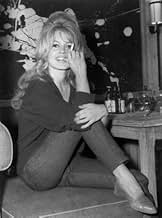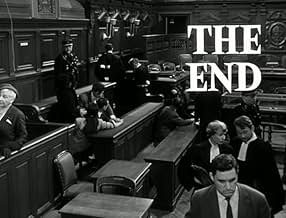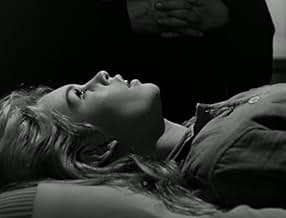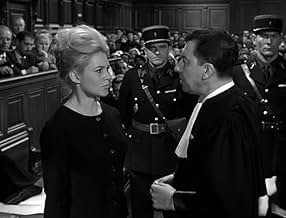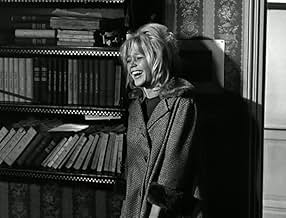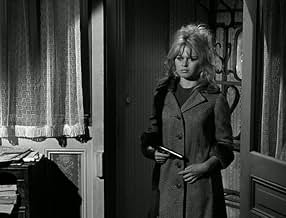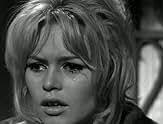Ein befreites Kleinstadtmädchen und die schwarzen Schafe der Familie ziehen mit ihrer Schwester nach Paris, nur um für den schockierenden Mord an ihrer jungen Geliebten vor Gericht zu stehen... Alles lesenEin befreites Kleinstadtmädchen und die schwarzen Schafe der Familie ziehen mit ihrer Schwester nach Paris, nur um für den schockierenden Mord an ihrer jungen Geliebten vor Gericht zu stehen.Ein befreites Kleinstadtmädchen und die schwarzen Schafe der Familie ziehen mit ihrer Schwester nach Paris, nur um für den schockierenden Mord an ihrer jungen Geliebten vor Gericht zu stehen.
- Für 1 Oscar nominiert
- 3 Gewinne & 2 Nominierungen insgesamt
- Daisy
- (as Barbara Sohmers)
Empfohlene Bewertungen
THE TRUTH – included in the all-time top 3,000 movies ranked by the "Wonders In The Dark" website – was the only title involving either to be nominated for the Best Foreign Language Film Oscar: incidentally, it is preceded by the Columbia logo and, apparently, was simultaneously shot in English as per contemporary posters!; for what it is worth, the film deservedly missed out to Ingmar Bergman's beautifully stark parable THE VIRGIN SPRING (1960) – even if they actually emerged joint winners at the Golden Globes! Anyway, what we have here is the trial of a crime of passion (with the star herself in the dock), the backstory of which is then seen in flashback – triggered off by the interrogations of various witnesses. Clouzot managed to rope in an impressive supporting cast for his plethora of characters: Charles Vanel as Bardot's practiced Defense Counsel, Paul Meurisse as the showy Prosecutor – incidentally, both these actors had already appeared together for Clouzot in one of his greatest works, DIABOLIQUE (1955) – and youngsters Sami Frey and Jacques Perrin among the uninhibited (what else?) protagonist's numerous lovers, the former being also the victim in the case.
The director's renowned clinical eye for detail is well in evidence throughout – but the film's two sections do not necessarily jell in this particular instance (perhaps tellingly, the 122-minute movie had as many as six scriptwriters assigned to it!). The narrative proper, then, seems to belong to the 'wasted youth' trend kickstarted by Federico Fellini's I VITELLONI (1953); indeed, despite their highbrow aspirations (musician Frey juggles a relationship with Bardot and her 'saintly' elder sister, all the while attempting to set up his own orchestra!), these singularly colourless personages come across as low-lifes more than anything else: the crime itself, followed immediately by the heroine's attempted suicide, is easily the standout here. Conversely, the backhanded tactics prevalent in the over-crowded courtroom lend much cynical enjoyment – thus countering the necessarily static nature of the cinematography during these sequences.
Still, the film is considered as the one in which the star gave her best performance (she even won the Italian equivalent of the Oscar for it as Best Foreign Actress): though the events leading up to the night of the crime and where the real guilt lay (hence the title) are hotly debated by both sides, it is inconceivable to accuse Frey (who could hardly be blamed for lusting after Bardot) over her (whose feelings for him – whether genuine or merely to spite her "square" sibling – are never properly defined) which is perhaps why the trial ends abruptly as it does! In retrospect, the movie can be seen to have much in common with the afore-mentioned "Inferno" – whose troubled shoot was delineated in a feature-length documentary released in 2009 (after Claude Chabrol had already impressively refashioned Clouzot's original script for his own 1993 effort L'ENFER).
Indeed, the truth is that Henri-George Clouzot's film of the same name has been sentenced to decades of cinematic oblivion, 7 reviews on IMDb says enough. And the injustice is even more cruel because the movie stands alone as a masterpiece of the genre in a period full of gripping courtroom dramas such as "12 Angry Men", "Anatomy of a Murder", "Judgment at Nuremberg" or "Inherit the Wind" where the verdict mattered less than the quest for truth it initiated and the statements it spoke about the impact of human perceptions in the exercise of justice.
This is why the main question in "The Truth" is not 'who killed', not even 'how', but 'why?', the film takes place during the trial ensuing the murder of Gilbert Tellier, Sami Frey as a talented, handsome and ambitious conductor by his beautiful girlfriend, Dominique Marceau, who tried to kill herself right after. Dominique is played by a 25-year old Brigitte Bardot, in a breakthrough dramatic performance, that elevated her status to the most promising actress of her generation rather than a one-dimensional bimbo.
Yet Bardot's sex-appeal is still significant to the story as Clouzot intelligently exploits it to highlight the sulfurous past of a young idle girl who used her body as an asset, to live without working, without prostituting herself either. Indeed, Dominique Marceau isn't the typical slut: there is in her attitude something that nonchalantly confines to pathos, embodying the unease of the 60's youth, being in her own feminine and naughty way, a sort of rebel without a cause. And the intent of Clouzot is less to make a social commentary but to explore the different facets of a seemingly obvious personality.
The trial becomes the setting for a gripping character study, revisiting the life of Dominique Marceau before the killing from the perspective of two different counselors, played by two giants. Paul Meurisse denounces Dominique's laziness, the jealousy she always felt toward her more studious sister Annie, and a bunch of former lovers come to belie her faithfulness and love for Tellier, whom she murdered by vengeance, because she couldn't stand his relationship with Annie. As for her suicidal attempts, there were calculated acts since she was always sure someone would come at time to save her.
On the other side, Dominique's lawyer, played by Charles Vanel, tends to demonstrate that the murder was a passioned crime, an act of desperation from a tormented woman, as Dominique truly loved Gilbert and couldn't imagine life without him. One of the film's greatest delights is the verbal duel between the two actors, and their interactions that remind some of the great courtroom dramas, when two respectable adults, even friends, become visceral enemies during the trial, James Stewart and George C. Scott, Spencer Tracy and Frederic March or more recently, Tom Cruise and Kevin Bacon.
The interest of the Meurisse/Vanel antagonism is to keep a shadow of mystery around Bardot's real personality, a villainous killer or a woman victim of her passion. And as the story progresses, Dominique's portrait, originally painted in black and white reveals many shades of gray while her victim, the good-hearted Tellier becomes less and less innocent. The story opens in Paris where Bardot embodies the youth's ennui, living like a sort of social parasite whose only excuse is to use her body as thin consolation. Yet, she can't be a slut because she's totally unaware of conventions, she's beyond them, and doesn't even feel guilty.
Naturally, the inevitable happens, Tellier, Annie's friend falls in love with the sensual provincial girl. It's the typical love at first sight, but it's handled in a very talented way by Clouzot who's a real craftsman when it comes to human emotions. Hefirst meets Dominique when she's lying naked, topless in her bed, swinging her beautiful behind to some mambo music, she incarnates the luscious fruit, she's everything her sister is not, that's what makes her so obsessively desirable. Then the romance between Marceau and Tellier turns into a series of passion, deception, treachery and arguments like only a director like Clouzot could have painted without falling in a sentimental or either Manichean trap.
And as we get closer to the murder, we understand the roots of Dominique's behavior and her suicidal attempts carry deepest significances, rather than an act of despair, they crystallize the vulnerability of a girl that tries to find her place in society, torn between the true love of Gilbert and a sort of paradoxical innocence that raises above her lust. It feels strange but when you keep an eye on Bardot's performance, you'd think twice before calling a girl, a slut. Bardot was the perfect choice for the role and her breakdown transcends the sensual contours of her delicious body and can touch any soul.
After watching the film, I guess the reason of its lack of notoriety is the fact that H-G Clouzot is renowned for several masterpieces of the thriller genre, blending it with elements of horror, mystery or police procedural, therefore, a movie like "The Truth" comes too late in his filmography and doesn't meet the same recognition than the acclaimed "The Crow", "Quai des Orfèvres", not to mention the classic "Wages of Fear" and"Diaboliques". But on its own, it's a magnificent exploration of the human soul, a masterfully written courtroom drama, and still a Clouzot's film with its dark and pessimistic undertones, and the eternal cloud of ambiguity that envelops the character's personalities.
Bardot lived a romance with Frey after the film, and she was so affected by the experience that like her character, she tries to commit suicide, if a film haunted its own actors, it gives you an idea about the psychological impact it might have on you
Resume:
First watch: 2020 / How many: 1 / Source: DVD / Rating: 8.75
Wusstest du schon
- WissenswertesDirector Henri George Clouzot pushed his actors and actresses so hard - Sami Frey and Jacques Perrin were about to hit him in the face - that Brigitte Bardot tried to commit suicide after the shooting. She was too much implicated, involved in the Dominique character. She also said that this movie was the only one in her career which she was really proud of.
- Zitate
The Prosecuting Attorney: You spent weeks seducing him, didn't you? Weeks!
Dominique's Attorney: Objection! What length of time should she have spent? Is there any legal limit on how long a seduction ought to take?
- VerbindungenFeatured in The Art of Arts TV: The Single Arts Film (2008)
- SoundtracksL'Oiseau de Feu
Written by Igor Stravinsky
Top-Auswahl
- How long is The Truth?Powered by Alexa
Details
- Erscheinungsdatum
- Herkunftsländer
- Sprache
- Auch bekannt als
- The Truth
- Drehorte
- Rue Saint-Antoine, Paris 4, Paris, Frankreich(Dominique hit by a bus)
- Produktionsfirmen
- Weitere beteiligte Unternehmen bei IMDbPro anzeigen
- Laufzeit
- 2 Std. 8 Min.(128 min)
- Farbe
- Seitenverhältnis
- 1.66 : 1

